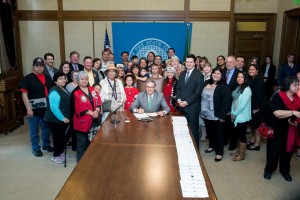Yesterday Governor Jay Inslee signed Washington HB 2080, which vacated pre-1975 state court convictions of tribal members who were engaged in Treaty fishing activities. Reconciliation.

Today a piece by Gabe Galanda, "Washington Tribal/State Relations Evolving, But Further Work Is Needed," was published in the Spring 2014 edition of Indian Law Newsletter. Truth.
A passage:
Over the next decade Washington’s “fish wars” ensued, with state and local law enforcement utilizing criminal arrest to deprive Indians of Treaty-reserved fishing rights, making matters even worse. An epic clash of sovereigns ensued in the U.S. v. Washington litigation, resulting in a controversial decision by U.S. District Court Judge George Boldt that guaranteed the Tribes half of the fish harvest and by 1979, a momentous Indian victory before the U.S. Supreme Court.
The state was so resistant of Judge Boldt’s decision that the Ninth Circuit Court of Appeals compared it to states in the Deep South that refused to abide by federally mandated desegregation. “Except for some segregation cases . . . the district court has faced the most concerted official and private efforts to frustrate a decree of a federal court witnessed in this century,” appellate court justices said of the Boldt Decision. In the end, the judicial affirmation of the Tribes’ reserved Treaty right to fish, expressed as “their source of food and commerce,” solidified a foundation for the economic development we are witnessing today throughout Washington Indian Country.
Above all, though, “the Boldt Decision” entrenched Washington Tribes as a legal and political force to be reckoned with.
He dedicates this article to those Washington Indians who fought the fish wars and to the tribal lawyers who won the Boldt Decision.
Gabriel “Gabe” Galanda is the Managing Partner at Galanda Broadman. He is an enrolled member of the Round Valley Indian Tribes of Covelo, California. Gabe can be reached at 206.691.3631 or gabe@galandabroadman.com.




